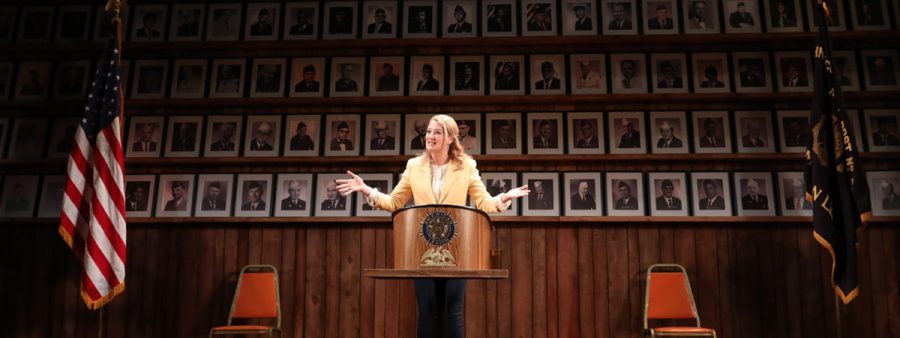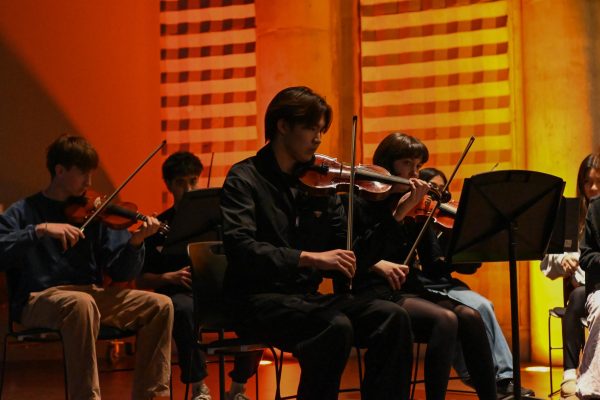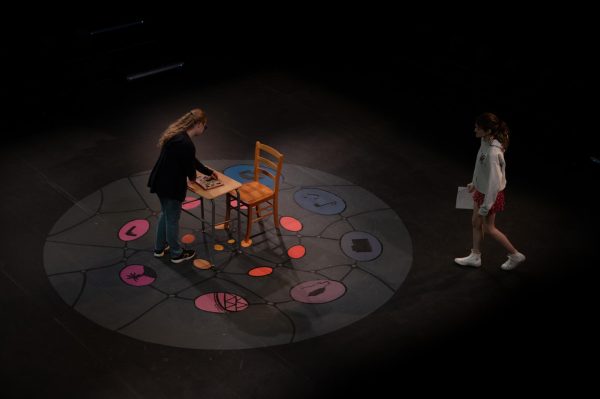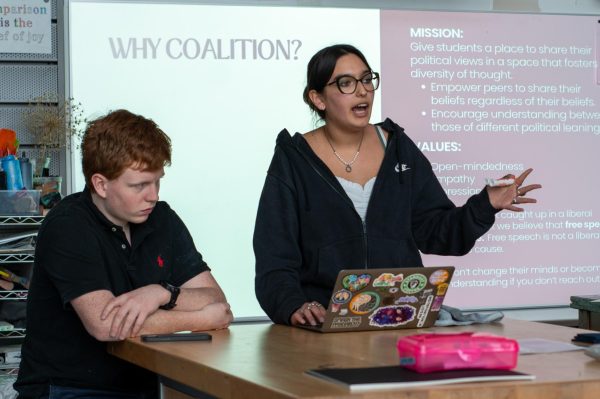Feminism and Freedom: ‘What the Constitution Means to Me’ entertains with wit, provokes political introspection
An army of muted portraits of old white men stares blankly out from the walls above the stage. Below, the animated features of actress and writer Heidi Schreck light a dim Broadway stage. Ms. Schreck dons a pastel yellow blazer and unwavering smile, armed with her teenage self’s equally unwavering faith in the U.S. Constitution.
An engaging blend of comedy and reflection, “What the Constitution Means to Me” provides a good laugh and the tools for an informed re-evaluation of our founding document’s role in modern politics at a time when we could all use some of both.
The set of “What the Constitution Means to Me” is a recreation of the American Legion hall in her Washington state hometown, where, as a teenager, Ms. Schreck would debate the intricacies and wonders of the Constitution. In the show, Ms. Schreck reenacts one such competition, frequently departing from her teenage ideals to discuss, through hilarious and poignant anecdotes, how her relationship with the document has developed since.
“What the Constitution Means to Me” did not go unnoticed in awards circles. The show was a Tony Award nominee, along with Ms. Schreck herself, and Ms. Schreck was a finalist for the Pulitzer Prize for Drama. Audiences can now watch the show from home on Amazon Prime. The multi-camera recording offers a cinematic view of a 2019 stage performance, providing a clearer picture of the show than a live showing could lend.
Ms. Schreck’s bright personality brings a much-needed balance to what would be nearly two hours of heavy subject matter. Throughout the show, she interweaves personal stories about the impacts of the Constitution with witty jokes about Patrick Swayze. As her teenage self, she is “psychotically polite,” yet when she drops the act to recount her family’s generational trauma, her voice fills with pain and passion.

Heidi Schreck speaks to the audience during a 2019 performance of “What the Constitution Means to Me” at The Hayes Theater on Broadway.
Throughout the play, Ms. Schreck draws on a history of violence against the women in her family to analyze what is and what could be the role of a Constitution. Through a personal narrative, she simultaneously highlights the historical failings of the Constitution to protect women from violence and explains the concept of negative rights: rights that prevent the government from harming people rather than obligating it to protect them.
In a heartbreaking moment, Ms. Shreck plays audio from the proceedings of Town of Castle Rock v. Gonzales, a 2005 Supreme Court case in which police failed to protect plaintiff Jessica Lenahan’s children from her abusive husband, against whom she had filed a restraining order. The police refused to help even after she went to them rightfully suspecting that her husband had abducted her children. In the audio, Justice Antonin Scalia can be heard debating, with harsh detachment from the case’s humanity, the meaning of the word “shall.”
It seemed unimaginable how anyone could get lost in the meaning of a word written 200 years ago when considering the livelihood of a woman who had lost so much. The court determined that the police had no obligation to save her children. Ms. Schreck’s emotional connection to the case drives home her argument: a document based on what the government cannot do will never suffice to secure the rights of its people.
The show is not all monologue. Halfway through the show, Mike Iveson, the man who plays the American Legion member who lead Shcreck’s debates as a teenager, sheds his uniform and tough act to share stories about his sexuality and his relationship with his father. The show ends with a debate between Ms. Schreck and Rosedely Ciprian, a 14-year-old debater, which culminates in a randomly-selected audience member deciding who won the debate for or against — and with it the fate of the Constitution.
While Mr. Iveson’s speech was amusing, it was a bit difficult to see how it fit into the rest of the show. Ms. Schreck initially brings him center-stage to read out notecards on the history of U.S. legislation on violence against women. What could have been a powerful moment linking a history of oppressive rulings to Town of Castle Rock v. Gonzales is lost during an awkward transition to what is essentially stand-up.
The debate between Ms. Ciprian and Ms. Schreck, on the other hand, concluded the show effectively, leaving audiences with two powerful examples of how to form their own views on the Constitution. Although it may sound clichéd, watching Ms. Ciprian debate made me excited for the current and future impact of the women of my generation. I couldn’t help but grin as she clinched her argument for the creation of a new document, proclaiming herself “one of this generation’s founding daughters.”
The show’s arrival to Amazon Prime came just at the right moment. Broadway audiences have been deprived of content due to the coronavirus and, with the death of Justice Ruth Bader Ginsberg and the recent confirmation of Justice Amy Coney Barrett in her place, the relationship between the court and the Constitution has never been more relevant.
With many of what should be basic human rights on the line due to originalist interpretations of the Constitution, a reevaluation of the document itself seems well overdue. “What the Constitution Means to Me” offers just this, along with a good laugh.
































































